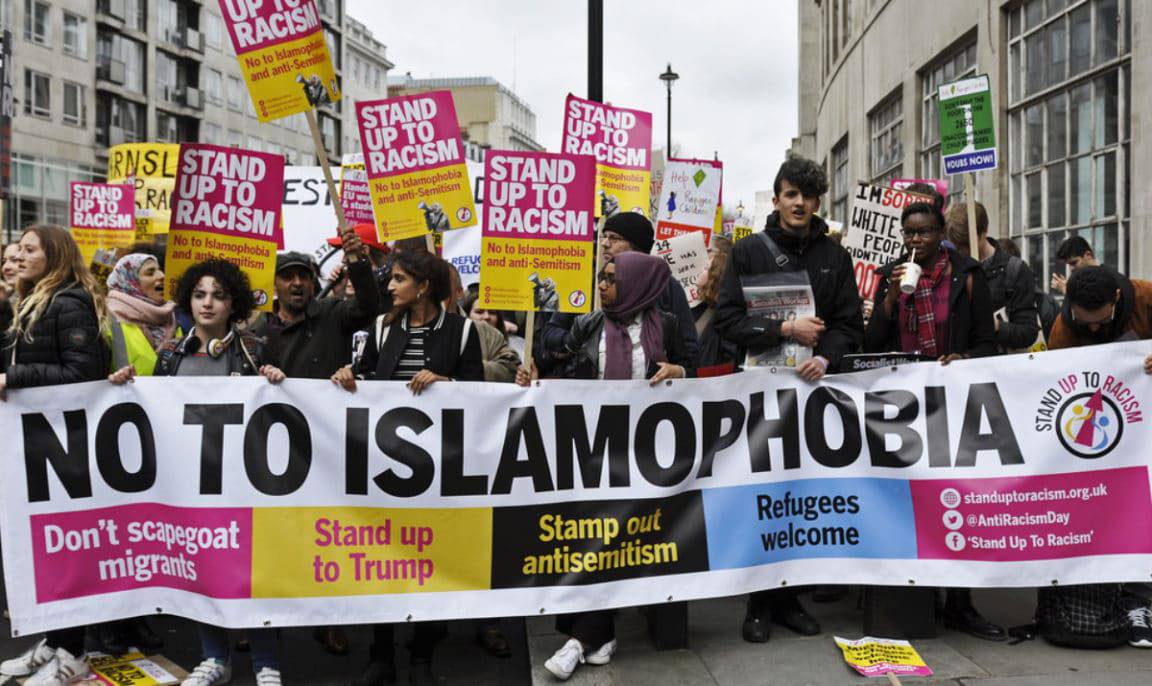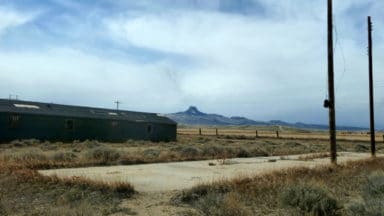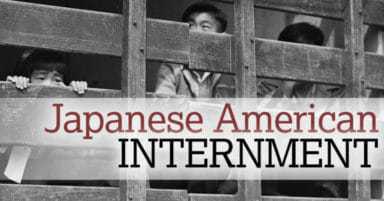Homa Miazad and her daughter Nadia Najim are anxious. “The internet has affected me most,” Miazad explained. “It’s like road rage. Behind a computer, people can really be hateful, and I carry that fear with me through the day.”
Miazad and her daughter were members of a panel on Islamophobia held at the City Club of Portland in January. She wore the two-piece hijab, a close-fitting purple cap under a black scarf, tucked neatly around her shoulders. As she talked, she gestured with her hands, fingers bright with red nail polish.
Nadia, her high-school-age daughter, wore a longer, gray hijab, draped loosely around her shoulders. The two women are among the approximately 20,000 American Muslims living in the Portland area.
The panel was moderated by Somali-American Kayse Jama, founder and executive director of the Center for Intercultural Organizing. In addition to the mother and daughter were Kambiz GhaneaBassiri, originally from Iran, now professor of religion and humanities at Reed College and author of “A History of Islam in America,” and Wajdi Said, who immigrated to the U.S. from Yemen in 1987 and is co-founder and president of Portland’s Muslim Educational Trust.
Miazad had emigrated from Afghanistan at age 9 and grown up in New York, watching “The Brady Bunch” on TV and, as she recounted, living the American dream. After the Paris attacks, followed by some of the most vicious political rhetoric, it must have felt more like a nightmare.
“For those first couple of weeks, my husband and I were thinking, ‘Where should we go?’ Those were the thoughts my parents had when Russia invaded Afghanistan.”

But after talking to their friends and supporters, she changed her mind. “We were no longer thinking about where we should go, but what we could do to make a change.” She considers herself lucky that she lives in Beaverton, where she feels a lot of support from local people.
“People do the smallest things without saying it, like they know what I am going through. They make eye contact, hold the door, and tell me to have a wonderful day. I feel like hugging them.”
Miazad worries about her children, who don’t always tell her what they experience day-to-day. Long after the fact, she found out about an incident in Target where a woman noticed Nadia’s hijab and told her son, easily within earshot, that Nadia was a terrorist.
Nadia, who is now a senior at the Oregon Islamic Academy, admits that she lives in a protective “bubble,” and for that reason, she is reaching out to students outside her community. For example, she has gone to Temple Beth Israel to hang out with Jewish youths.
“Every time people reach out to each other, it’s another bridge built,” she told the City Club audience.
GhaneaBassiri said anti-Muslim sentiment in America is not new, whereas Islamophobia is.
“This is not about fear of Islam,” he explained. Those who foment Islamophobia, he said, “tend to concoct this fear for reasons of political gain, for economic gain, for marginalizing Muslim minorities.” In other words, politicians use it as a campaign strategy: make people afraid. As an example, he pointed out that Islamophobia got ramped up around the plans for building an Islamic center near Ground Zero in New York City. Once the 2008 election was over and the center was built, nobody talked about it anymore.
Said brought up the blatant double standard.
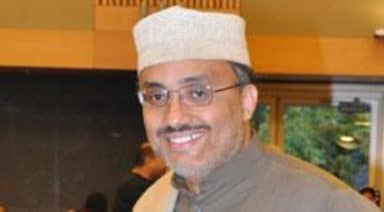
“One hundred and eighty international Muslim leaders have signed a condemnation against ISIS,” he said. But when Anglo-Saxon Christian fundamentalists (one could say terrorists) bomb a clinic or a government building, nobody expects Christian clergy to express regret that someone of their faith has committed murder. “Why don’t we say that the Christian bodies have to condemn this?” Similarly, when Buddhists massacre Muslims in Burma, we don’t ask Buddhists around the world to apologize. “Violence is violence!” he said.
Muslim clerics everywhere, in the U.S. and abroad, have stated emphatically that ISIS in no way represents Islam. Said deeply regrets that these terrorists have called themselves the Islamic State. “They are thugs, and we should call them thugs,” he said. “Extremism has no religion.”
The truth is that ISIS has completely misnamed itself. The word “Islam” means “Peace,” the antithesis of what ISIS stands for. Said spoke eloquently about the Golden Age of Islam, or the Age of Medina, centered in the Middle East. For 500 years, between the eighth and 13th centuries, science, trade, the arts and culture flourished in a very heterogeneous society while Europe was mired in the Dark Ages. The history of this rich, multi-cultural society should teach us how ethnic and religious diversity can lead not only to peace but also to prosperity.

A month before the City Club panel, Stephanie Potter, for KBOO’s Recovery Zone, had interviewed Wajdi Said, along with Ned Rosch and Jan Elfers, all of them recognized leaders in the interfaith effort to promote understanding, tolerance and peace. These participants represented Islam, Judaism and Christianity, the three religions making up what is known as the Abrahamic tradition. The discussion revealed not only their common ground but their passion about how interfaith communication can lead to a better world.
On KBOO, Elfers pointed out how each of the three Abrahamic faiths calls us to stand up for anyone who is stigmatized because of their religion, race or ethnicity.
“What I find so discouraging,” she said, “is how many people are living in fear when our scriptural texts are so clear. … Faith is about courage, it’s about compassion and love, and fear is the opposite of that,” she said.
In fact, as she would remind us, some variation of the phrase “be not afraid” is used in the Bible more than 100 times. She reported that Ecumenical Ministries of Oregon (EMO), the organization she directs, has received many phone calls from people in Christian organizations asking how they can support their Muslim brothers and sisters.
Said suggested that we be more careful about our use of language. Not many people know that the original meaning of the word jihad is the process of becoming a better human being. In other words, jihad is a daily, personal spiritual journey, not at all the way the media uses it. In today’s media frenzy, words like “Islamists” and “Islamofacists” are thrown around much too glibly by politicians and pundits. Instead of the term “Islamic terrorists” what about just “terrorists”?
I phoned Ned Rosch for a brief interview. He is an active member of the Portland chapter of Jewish Voice for Peace (JVP), an organization committed to fighting Islamophobia. He deplored the American media’s preoccupation with linking horrific events to the Muslim faith.
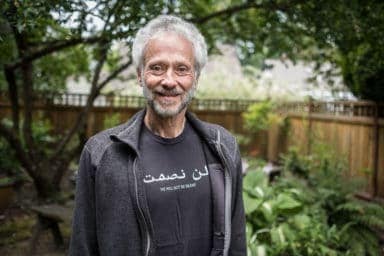
“This is just what ISIS wants,” he pointed out, “to stir things up and make everybody afraid.” He also said that we need to dispel the propaganda about the historic “Clash of Civilizations” between Muslims and Jews, which is not historic at all.
Propaganda against Muslims has been inherent in our foreign policy over recent decades, Rosch noted, including the misperception in the West that Islamic civilization is out to destroy us all. With the breakup of the USSR, our military-industrial complex needed a new enemy to justify our bloated defense budget, so we invaded Iraq.
“We also fired all of their civil servants and ruined their society. All this led to huge resentments. ISIS came out of the destruction of Iraq,” he said.
The Portland chapter of JVP held rallies in December at Pioneer Courthouse Square and the Lloyd Center demonstrating their stand against Islamophobia as a way of observing Hanukkah. Participants held nine signs, which together formed the shape of a menorah, each sign spelling out an injustice that needed to be rectified. One of the statements called for a refusal to be silent about anti-Muslim and racist hate speech; another condemned state surveillance of the Muslim community.
JVP’s website offers posters saying “Refugees are welcome here” that can be downloaded. T-shirts and other materials are available for sale. JVP volunteers have walked printed posters around to businesses in the city with a request to put them in their shop windows. The posters said: “Stop Profiling Muslims”
Long before the invasion of Iraq, the Middle East was carved up by Western powers. Rosch is not the only one who has noticed that the U.S. systematically overthrows or assists in the demise of existing governments, nearly always leading to chaos. The current result is that we have the biggest refugee crisis since World War II. And we have ISIS. Rosch believes that all this is consistent with our history. “Our country was founded on genocide, then built upon slavery, and there’s never been a public apology to either of these groups,” he observed bleakly.

Despite a number of misguided federal attempts at concocting terrorist cases, Oregon has experienced less anti-Islamic activity than many other places in the nation. But we haven’t been immune. For instance, during the election fever of 2008, The Oregonian delivered it to our doorstep. A free DVD titled “Obsession: Radical Islam’s War Against the West” was tucked into the Sunday paper on Sept. 28, 2008, as “advertising.” It was paid for by the shadowy Clarion Fund, founded by the Canadian-Israeli Raphael Shore. The film uses extensive Arab television footage of Islamic radicals threatening and inciting violence toward the West. It also includes scenes during the build-up of fascism in Nazi Germany. Twenty-eight million of these DVDs were distributed by some 70 newspapers around the country, including The New York Times, although a few principled publishers refused.
Portland Mayor Tom Potter reviewed the DVD and asked The Oregonian’s publisher, Fred Stickel, not to distribute it. According to a spokesperson in City Hall, “The mayor felt that the tenor of the video contributes towards a climate of distrust towards Muslims that holds the entire Muslim community accountable for the actions of a dangerously misguided few. Distributing (it) with The Oregonian lends the video an impression of objectivity and legitimacy it does not deserve.”
Stickel replied that the newspaper had an obligation to accept the DVD as an advertisement on the principle of free speech. A group of more than 30 religious and community leaders also asked Stickel not to distribute it, to no avail. As a last resort, the city’s diversity officer organized a protest in front of the newspaper’s office, but the damage was already done.
During 2012, messages to “Defeat Jihad,” aimed mainly against Palestinians, were posted on Portland buses despite TriMet’s objections. Four years earlier, the Multnomah County Circuit Court had ruled that TriMet vehicles should be treated as public spaces and therefore subject to First Amendment protections. The ads remained for a month. They were funded by the American Freedom Defense Initiative, whose president, the hate-blogger Pamela Geller, has launched legal campaigns to force public buses all over the country to run the anti-Islamic messages. Although Geller continues to run ads in U.S. transit systems, she is beginning to get vigorous pushback from social justice groups. In the U.K., the Home Secretary banned her from entering the country because of her inflammatory statements and behavior.
No mosques have been bombed in Portland, as they have in several other places. But on Nov. 15, less than two days after the 2015 Paris attacks, a small crowd of protesters with loudspeakers demonstrated at the Rizwan Mosque in Southwest Portland. They shouted insults and obscenities at the faithful as they arrived for afternoon prayer. The ruckus drew the attention of neighbors and a woman who stopped her car, and together they confronted the protesters. The evening news played a cellphone video in which a woman’s voice could be heard above the din saying, “I feel sorry for you. I’m sure these people will pray for you. … You should be ashamed of yourself.”
Then on Feb. 10, Abdul Jamil Kamawal, a prominent and well-liked member of the Muslim community, was murdered in Metzger. The alleged killer, Michael Troxell, had been hired by Kamawal’s family to do some maintenance work outside a home on their property. The Washington County Sheriff’s Office decided not to investigate the murder as a hate crime. Public Information Officer Bob Ray stated that there was “nothing to indicate that it’s a hate crime” and that “everything has been investigated thoroughly.” However, a Feb. 18 article in The Oregonian reported that Kamawal was found outside the home without his shoes, a sign that he may have been praying at the time of his death, adding weight to the hate-crime theory.

In Portland, negative events have been somewhat counteracted by sympathy and outreach. On Dec. 16, the Portland City Council voted unanimously in favor of a resolution whose purpose was to “declare support for the City’s Muslim community and reaffirm Portland’s welcoming nature for all immigrants and refugees.” The resolution called the recent demands seeking a ban on Muslim immigrants “unconscionable” and a violation of both the U.S. and Oregon constitutions, as well as “tragically reminiscent of prior historic profiling of race and religion.” The resolution declares the Muslim population living in the Portland Metro area to be an important part of our growing multicultural identity. It calls for an end to the use of anti-Muslim and anti-immigration hate speech and resolves that Portland will continue to welcome many Muslims fleeing their violent and unsafe countries.
We need to learn more about each other’s cultures and religions. There are several active interfaith groups in Portland besides EMO. Wajdi Said mentioned a club for Christians, Jews and Muslims called Cousins, and Jan Elfers described a group called Between Women, where Christian, Muslim and Jewish women meet on a regular basis to talk about religion. Common interests in their kids and lives have led to lasting friendships. When Elfers hears someone making negative comments about Muslims, she often asks, “How many Muslims do you have as friends?” Or, “How much do you know about Islam?”
One way to get to know our Muslim neighbors would be to visit a mosque or Islamic center. There are at least 11 in the Portland metro area. Better yet, visit the recently opened center of the Muslim Educational Trust in Tigard. The MET is a community center and school dedicated to education, cooperation and networking through a variety of programs to benefit both Muslims and non-Muslims. The building houses a gym, swimming pool, Islamic museum, art studio and library, as well as classrooms.
The center hosts a potluck supper on the second Saturday of the month and serves brunches featuring Middle Eastern food every Sunday. The public is invited. The MET’s website, www.metpdx.org, announces current events of interest.
We can all go a little beyond our comfort zone and reach out to those who seem different from ourselves. Have coffee, visit a mosque, go to a brunch or potluck, take a course, or page through a copy of the Quran. Find out what Islam is all about – and what it is not about. We can even appreciate differences in appearance. In our midst are Jews wearing yarmulkes, priests and monks in long robes, ministers in clerical collars, and all kinds of people wearing crosses, so we should be able to appreciate women in headscarves. It is their right to wear them.
Nadia Najim asserted that right during the City Club forum when one of the audience members came up with what he thought would be a helpful solution. He noted that France has barred women from wearing the hijab and perhaps our country could do the same. That way, the differences wouldn’t be so obvious. Nadia was quick to point out that this was an Islamophobic suggestion. Next question.
